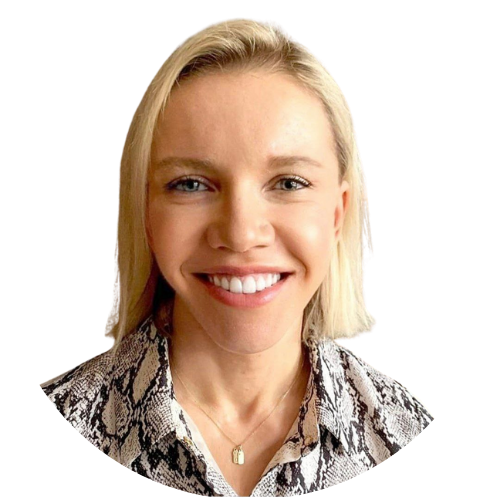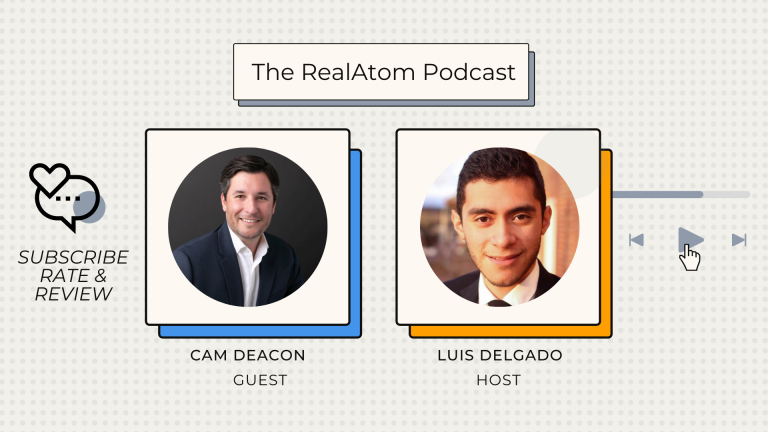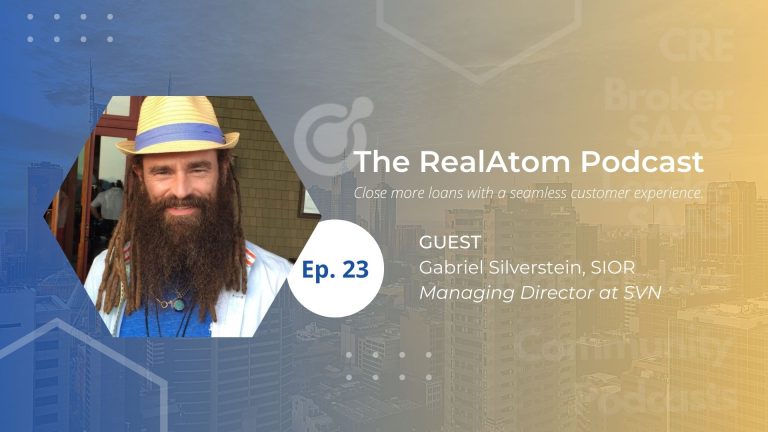 Yulia Yaani:
Yulia Yaani:
Hi, this is Yulia Yanni with ReaAtom, and this is our new podcast series with innovators in the commercial real estate lending industry. Just before we start, ReaAtom is the industry-leading lending SAAS technology that powers commercial real estate lenders like banks, credit unions, and non-banking organizations to make more loans. And today I’m welcoming our new guest founder and president of Eastern Union and leading national and commercial mortgage brokerage firm headquarters in New York with offices across the country – Ira Zlotowitz.
 Ira Zlotowitz:
Ira Zlotowitz:
Thank you so much for having me. We spoke for so many years, different technology, different ideas. And finally, we are at a technology podcast together.
 Yulia Yaani:
Yulia Yaani:
Well, with all the pandemic things now, that’s how we communicate. Right?
 Ira Zlotowitz:
Ira Zlotowitz:
Right. Listen, we started our conversation in a Starbucks near my Maryland office. That was our first meeting.
 Yulia Yaani:
Yulia Yaani:
The interesting thing is you were one of the very first people who reacted when we launched our platform, because you, and I think in the same direction, and I’m very happy to, you know, bring your thoughts to our audience today. So why don’t we start with you telling us about yourself and what you do?
 Ira Zlotowitz:
Ira Zlotowitz:
So, like I said before, we’re a commercial mortgage broker. We are probably the most technologically advanced and innovative in the industry. You know, COVID obviously brought, I say brought 2030 to 2020 and advanced the technology world 10 years and allowed us as well also to pivot and adjust to, to the technology. But we’re first and foremost, a trusted advisor. We’re humans first, in commercial real estate we’ll always need a human involved. Technology will empower humans to do more. So instead of a broker in my office, being able to close 50 transactions, with technology, they can close a hundred transactions, but the human is never gonna be replaced. And I think that with some different platforms the humans can be replaced. But people say technology will never replace the broker. So, therefore, don’t invest in technology. They’re also gonna be out. It’s gonna be a hybrid. And we believe that we built the best hybrid half-human, half machine. We have people in the office that know nothing about technology, but they only know the human side of relationships and there are t people who are doing machine learning, AI experts only focused on the technology and a lot of people are in-between. So with first and foremost, a trusted advisor as a broker, we stay very true to our course and, and have a core. And we utilize technology at every step of the flow of information and the processes to make sure that when a broker gets on the phone with a client and they talk to find out which bank to go to, we use the latest and greatest in technology and data to pinpoint the right lender for that situation.
 Yulia Yaani:
Yulia Yaani:
That’s a very good introduction of what you do, but you’ve been running your company for some time. Can you tell us how you started?
 Ira Zlotowitz:
Ira Zlotowitz:
So it’s actually, May 17th which is actually going to be the 20th anniversary. I started in the business, I’ve been in the business for 24 years. I’m fortunate enough to be able to be doing the same thing for 24 years, be a trusted advisor for the largest real estate owners and banks. So as a firm we started 20 years ago. We started just with a, you know, like everyone else’s with a small office. And I always believed in building that trusted relationship and advisory. And then I took a slightly different approach. I always viewed the business to become a business where clients and brokers were really selling and buying data.
Can you break it down? A broker is selling data. I know which bank is hot, which bank is not, which bank we’ll do this particular deal with. How does the bank want to see the numbers? How does the bank underwrite the deal? How do you underwrite your deal? And based on that, making all those matching points of, what we built, what we did. So I started off as a small company to keep those core values in place. And we spent the last 20 years building and adapting at any single time to the changes that the market is going through. The market will keep coming through. And as a commercial mortgage broker, a trusted advisor to these clients, we had to adjust to what was needed each time. So we built uniqueness now to a lot of other firms, as well as on the human side as well, where we’re the only mortgage brokerage firm, to my knowledge, that has a credit department.
When a deal comes in, our credit department reviews it and decides whether we shouldn’t take on that assignment. And, even if we do take on an assignment, make sure that the information has checks and balances. Information is valid through the process. Now we’re not a bank and this is self-imposed. So it’s not like banks using us because of it. These are the things we put are self-imposed in the front end. We have a special department just for underwriting and setups. So we have a department that assists the brokers and we have a department of banking. Literally this past week, we brought another five people to the banking department. We now have over 10 people that focus on the technology side of it. If you have the focus on actual bank analyzing deals to really make sure that when a broker brings in a deal on behalf of a client, they’re getting the best that humans could build that relationship and know about banks index every single bank in the country to know, Hey, which is the right bank to get it done. So, as commercial mortgage brokers, we’re going to keep adapting to what’s needed at that time. And try to always take the approach that we’re young enough to change, experienced enough, to get your deal done and execute. We have to go ahead and execute from that.
 Yulia Yaani:
Yulia Yaani:
Interesting. Good. I just heard that you guys are very hands-on when it comes to the deal in terms of underwriting, execution, sourcing lenders. When does technology come into that picture?
 Ira Zlotowitz:
Ira Zlotowitz:
Let’s say, the loan process will take 20 human hours, a time spread out over a few months. We use technology to be able to streamline that process instead of 20 hours, then 19 hours, 18 hours, 17 hours, and 16 hours. That’s one side of it.
The other benefit of the technology is more on the data side of it. How can we collect and know data from every part of the country, and then the broker knows where to go. So for example, we built this technology internally (the banking team calls it QTS), which is the acronym for quotes in term sheets. Brokers could literally type in an address into the system. And the system will tell the broker, which banks are potential lenders and sort it in the probable order of who will be the best for that deal and can give you all the background information on that bank.
What usually happens in the industry is, a broker trusts his own gut to which banks to go to plus they call up other brokers and try to get different ideas.
Over here we have the system, the system is taken when you’re using technology to gather information from three sources. One is the public records, which banks close in that area, what property type. Two, every time you send a deal out to a bank, you get a quote, we make an offer and we submit it to a bank. It also tracks which banks that other brokers in the company actually send deals to and actually get quotes from. And number three is we have the human side in a conversation with bankers. mango, tell us I like multi-family and Texas.
So I have a great story. I’m having lunch with a banker. The banker is saying, by the way. I don’t know if I told you guys that we really do construction in certain areas. So I went into our system. I changed their lending criteria so that they’ll do construction in that area. And in like three minutes on his phone, he gets an email. And he goes like, you guys move fast. One of your team members has just sent me a deal that matches that criterion.
So the broker, my office, sent out a deal the day before to six banks, he’s trying to shop it. And all of a sudden the system tells the brother that he might also want to send it to this bank – click here.
Another fact is that everyone in the company uses one system. This makes us unique also from the largest firms. In most firms, the brokers have their own little book of how they keep their business. Here, everyone uses one platform, one system, the culture is a sharing culture of sharing data. So this information is searchable at any given moment.
 Yulia Yaani:
Yulia Yaani:
As soon as you said that shareable data, you know, we talk to so many brokerages in the country and everyone is so protective of their data. But I think what you guys do is really helping your clients to benefit from that, right? Because it’s not just me and my analyst situation, 20 more brokers in the company can dig into the database. Right?
 Ira Zlotowitz:
Ira Zlotowitz:
The reality is that, although it’s true, it helps a client, but if a broker’s not going to feel secure, then he can not help a client either. So it’s fine and dandy to put information into the company system, but they have to trust that the company is not going to go and take their data and use someone else’s information that could hurt them. The culture in the company is that everyone knows when I hire them I’m going to be an innovator. I’m always going to go with the market’s going. So if you, personally, like to do things the old way and stay that way, we’re not going to be a good match for you. We’re going to always want to go ahead and innovate. If we see the market heading in a certain direction, we’re going to lead.
There might be some of the biggest mistakes that we made. Did we go to certain areas, maybe a little too soon, and we could have had a few more years of a different way. But I invest heavily in technology. I started building this technology, you know, five, six years ago. I should have really thought of something only two, three years ago. Because of the market.
For the first two years, the counterparty wasn’t using technology enough. So how could I send them a deal on a platform they weren’t familiar with? You know, today we talk about New York City, and that there’s no more zoom. They’re never going to have a snow day anymore. There’s ever a day off from school to go on Zoom. Due to Pandemic, I realized while using zoom, the world changed. No banks are ever going to cancel a credit committee because “Oh, he’s on vacation – He can join”. You’re going to be, this is the schedule. If you take a vacation, tell your significant other that during these two hours, you have to have access to zoom and get onto. So I think the world has changed in that respect.
So everyone realized that they want to be out of the office and that’s going to last. So we’re using technology to really shave off time and the process brings you data and spends the money to do machine learning and AI that it should be able to. My goal is literally, to go like, Hey, Siri,what rate can I get on a multi-family in Brooklyn? And give me that answer. That’s my goal to build a technology. That’s simple.
When I have that, that simple, my brokers never miss a beat. So people asked me what actually makes a difference in my business? Where did I see the return on investment? Six months ago, from every 100 opportunities we got into office 16 moved forward. Now we’re holding to 27%. Clearly, in our opinion, it’s a lot of moving parts of the market and everything. But as we beefed up our banking relationships and figured out how to give that flow of information, back to each broker, they have Intel at their fingertips. That was a big contributor. You never get a hundred percent of clients for many reasons. The best of brokers typically average one out of three. Like in baseball, if you’re 333 on average, you’re great. We were at 16% with the new brokers. But the technology and the banking team made the difference. A new broker comes in. They’re immediately just as experienced and knowledgeable as a top broker when it comes to which bank to go to for that transaction.
 Yulia Yaani:
Yulia Yaani:
That’s a great insight. But let me ask you a tricky question. Everyone tells us that technology helps them to save time. What do you guys do with that free time
 Ira Zlotowitz:
Ira Zlotowitz:
Bring more deals! There are a certain amount of hours that I’m allocating between the two types of people. Some people come to work every day because they want to make a certain amount of money. Here is an amazing, great story about that line. So this person works at a warehouse. And the boss comes down to the warehouse. The worker in the warehouse asks the boss, what’s in that box that I climb up every day and the boss tells him it. And the boss tells the manager, give this guy a race. Okay? The boss comes back a month later, the manager pulls the boss aside. You know, since you gave the guy a raise, the guy started slacking off.
The boss goes to the worker: I don’t understand what happened. You did such great work. I gave you more money. And the worker goes, oh, you don’t understand. I need $312 a week. Whatever the math was, you gave me a raise, I could work less.
What I really tell people. What’s my end goal. What do I want to do with the success that I could have? So personally, I’d rather be able to give back. Train people, I am running a mentorship program now in the summer. I give back.
So if I could figure out how to automate this more and streamline more, the company grows. I love the fact that this past week we went to hire a bunch of people. I love the fact that we created a real estate bootcamp. And we actually hire people and people telling us they’re getting jobs in real estate. That’s the basic training. I’m allowing anyone that wants to learn real estate to join for the first three weeks as if they work as my company interns and do a real estate course simultaneously at the same time. So what am I doing? I decided I’m giving a certain amount of hours towards this business and the best to go. If I can make it more efficient, I’ll do more in that time.
 Yulia Yaani:
Yulia Yaani:
I was going to ask you this question at the end, but since you had spoken about training people and running bootcamp camp what would be one advice that you will give to new brokers to succeed in our industry?
 Ira Zlotowitz:
Ira Zlotowitz:
When I bring brokers on board, I say, if you want to be successful, you have to have two pieces of the puzzle. And obviously, you have to be honest and you have to have a good work ethic and all those pieces of the puzzle go with the, obviously, everyone’s gonna tell you, there are two pieces of the puzzle. You must have to start off your career. And if you don’t have this and you have to long-term vision, all those things of great, there’s two things. Number one, you have to take ownership for yourself. We’re living in a society today. When you mess up, you can not blame someone else. You take ownership, you have an issue, open your mouth. You’re not being successful. You know, what’s coming. Don’t blame anyone else. The bottom line is in spite of like, you know, Elon Musk got onto the set of SNL last week, and this is an amazing point. He got up there and said, he has Asperger’s. So he admitted to the world that of Asperger’s and he owned his weakness in spite of, and that’s the tell someone doesn’t change your weakness, come to the table and own up. This is you and appealing to different benefits they start at different times. Own up to who you are and take responsibility. Don’t blame anyone else…
Fill the form, if you want to see the full-text version of the podcast


;)



